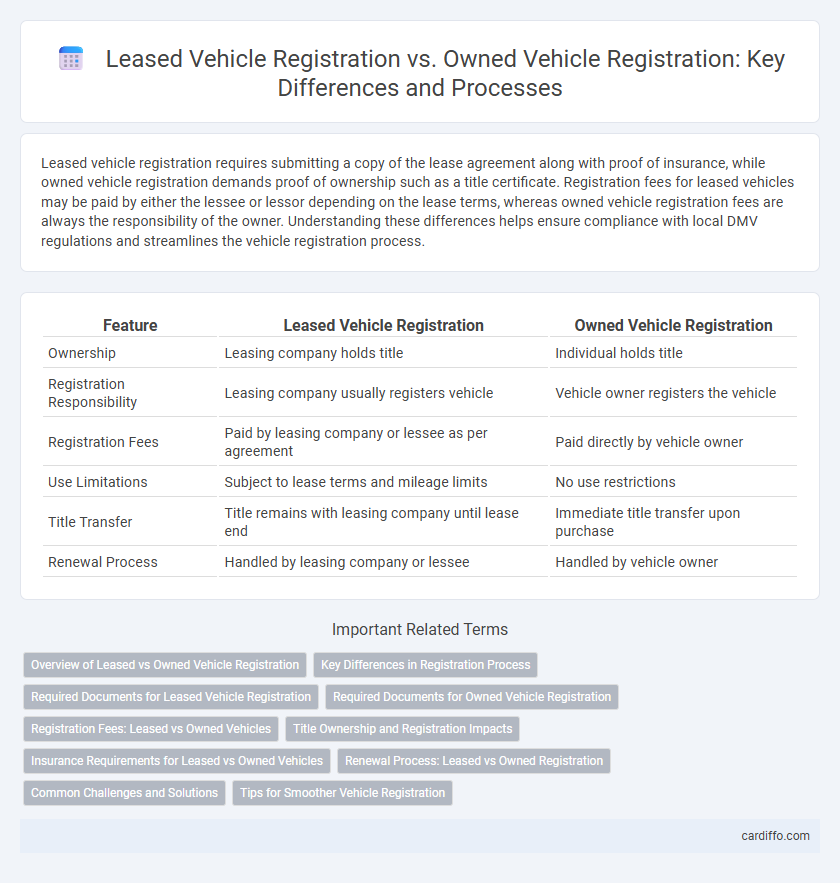Leased vehicle registration requires submitting a copy of the lease agreement along with proof of insurance, while owned vehicle registration demands proof of ownership such as a title certificate. Registration fees for leased vehicles may be paid by either the lessee or lessor depending on the lease terms, whereas owned vehicle registration fees are always the responsibility of the owner. Understanding these differences helps ensure compliance with local DMV regulations and streamlines the vehicle registration process.
Table of Comparison
| Feature | Leased Vehicle Registration | Owned Vehicle Registration |
|---|---|---|
| Ownership | Leasing company holds title | Individual holds title |
| Registration Responsibility | Leasing company usually registers vehicle | Vehicle owner registers the vehicle |
| Registration Fees | Paid by leasing company or lessee as per agreement | Paid directly by vehicle owner |
| Use Limitations | Subject to lease terms and mileage limits | No use restrictions |
| Title Transfer | Title remains with leasing company until lease end | Immediate title transfer upon purchase |
| Renewal Process | Handled by leasing company or lessee | Handled by vehicle owner |
Overview of Leased vs Owned Vehicle Registration
Leased vehicle registration requires the lessee to register the vehicle in their name while acknowledging the lessor's ownership, often involving additional documentation from the leasing company. Owned vehicle registration involves the vehicle owner registering the vehicle solely under their name with full ownership rights, allowing more flexibility in modifications and resale. Differences in liability, taxes, and renewal processes exist between leased and owned vehicle registrations, impacting the registration strategy based on ownership status.
Key Differences in Registration Process
Leased vehicle registration requires the lessor's information and often involves submitting a lease agreement, while owned vehicle registration primarily needs the owner's title and proof of purchase. Leased vehicles may require authorization from the leasing company for registration and renewal, unlike owned vehicles where the registrant has full control over the process. Differences also include responsibility for fees, as lessors sometimes handle taxes and insurance, whereas owners manage these directly.
Required Documents for Leased Vehicle Registration
Leased vehicle registration requires specific documents including the lease agreement, proof of insurance, and a valid driver's license, alongside the standard vehicle title and registration application. The leasing company often provides authorization documents confirming their ownership, which are essential for registration approval. These requirements differ from owned vehicle registration, where the title held by the registrant is the primary proof of ownership.
Required Documents for Owned Vehicle Registration
Owned vehicle registration requires essential documents such as the original purchase invoice, valid insurance certificate, proof of identity, address proof, and the vehicle's Manufacturer's Certificate of Origin (MCO). Additionally, submitting a valid Pollution Under Control (PUC) certificate and a completed application form ensures compliance with regional transport authority regulations. Providing these documents facilitates a smooth registration process for sole ownership verification and official vehicle records.
Registration Fees: Leased vs Owned Vehicles
Registration fees for leased vehicles often differ from those for owned vehicles due to varying state regulations and the involvement of leasing companies, which may include administrative fees in addition to standard registration costs. Owned vehicle registration fees are typically straightforward, calculated based on factors such as vehicle weight, age, and value without additional service charges. Understanding these fee structures can help consumers anticipate total costs and choose the most cost-effective vehicle registration option.
Title Ownership and Registration Impacts
Leased vehicle registration typically lists the leasing company as the title owner, which affects the legal responsibilities for taxes and insurance. In owned vehicle registration, the individual holds the title, granting full control over usage and transfer rights. Title ownership impacts registration renewals, lien disclosures, and eligibility for financing or sale transactions.
Insurance Requirements for Leased vs Owned Vehicles
Leased vehicle registration typically requires the lessee to carry comprehensive insurance coverage, including collision and liability, as mandated by the leasing company to protect their asset. Owned vehicle registration allows the owner flexibility in insurance choices but generally mandates at least state minimum liability coverage to comply with legal requirements. Insurance policies for leased vehicles often have stricter limits and coverage terms compared to those for owned vehicles, reflecting the leasing company's interest in mitigating financial risk.
Renewal Process: Leased vs Owned Registration
Leased vehicle registration renewal often requires additional documentation such as lease agreements and lessor authorization, while owned vehicle renewal primarily depends on proof of ownership and insurance. Renewal fees may vary, with leased vehicles sometimes incurring higher administrative charges due to third-party involvement. Timely renewal is critical for both registrations to avoid penalties, but leased vehicles may have stricter compliance deadlines set by leasing companies.
Common Challenges and Solutions
Leased vehicle registration often involves obtaining documentation from the leasing company, which can delay the process due to third-party verification requirements, whereas owned vehicle registration requires proof of ownership and may face challenges related to title transfer or lien clearance. Common solutions include ensuring all lienholder information is readily available for owned vehicles and maintaining clear communication with lease companies to expedite authorization for leased vehicles. Both processes benefit from pre-verifying documents such as proof of insurance, identity, and applicable fees to minimize registration delays.
Tips for Smoother Vehicle Registration
Ensure all necessary documents, such as the lease agreement or title, proof of insurance, and identification, are prepared beforehand to expedite leased and owned vehicle registrations. Verify specific state DMV requirements for leased vehicles, which often include lessor information, to avoid processing delays. Schedule appointments online where possible and double-check fee structures to streamline the registration experience.
Leased Vehicle Registration vs Owned Vehicle Registration Infographic

 cardiffo.com
cardiffo.com